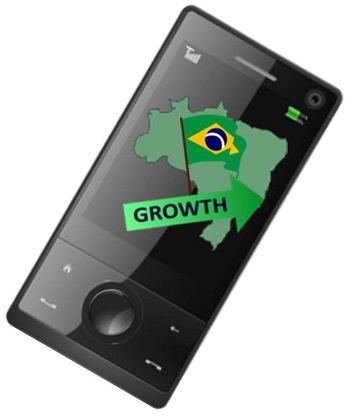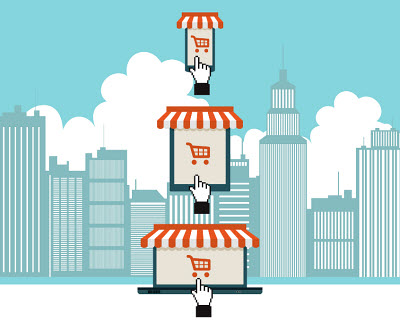Despite the success of smartphone based shopping in the country, there are still a number of hurdles to overcome.
According to a recent mobile commerce report that was published under the title “WebShoppers”, by the e-Bit consultancy firm, the number of people in Brazil who are using their smartphones for online shopping purposes has increased by 84.2 percent within the last 12 months.
In June of this year, m-commerce represented 7 percent of the total transactions occurring online.
When compared to the figure at the same time last year, which was only 3.8 percent, it is clear that mobile commerce is an area that is making rapid headway within the Brazilian marketplace. During that same period of time, the number of transactions that were actually carried out totaled 2.89 million. This brought in $497 million, said the report. Among the top performing segments over mobile shopping were fashion and accessories, as well as cosmetics and health products, and electronics.
The report believes that if the rate of growth continues this year, mobile commerce will represent 10 percent of online shopping.
 Fashion and accessories made up 18 percent of all of the m-commerce sales. This was followed by the cosmetics and health products category which brought in 16 percent of the sales over smartphones and tablets. Eleven percent went to the sales of electronics products. The report predicts that online outlets in Brazil will have served 63 million unique customers by the close of 2014.
Fashion and accessories made up 18 percent of all of the m-commerce sales. This was followed by the cosmetics and health products category which brought in 16 percent of the sales over smartphones and tablets. Eleven percent went to the sales of electronics products. The report predicts that online outlets in Brazil will have served 63 million unique customers by the close of 2014.
Comparatively speaking, while the e-Bit prediction is that mcommerce will represent 10 percent of the total of online sales in Brazil, in the United States, that figure is expected to by 29 percent, according to Forrester Research.
Though the growth of mobile commerce is quite strong in Brazil, the report has identified a number of barriers that have stopped it from keeping up with certain other markets, such as the United States. This includes the low penetration of residential WiFi, as well as the issues with 3G coverage. The e-Bit report identified those struggles as the main problems standing in the way of the true success of the channel.
Kash aims to sidestep credit card fees and allow retailers to interact with consumers more directly
Starbucks has found a great deal of success in its mobile commerce endeavors, which has encouraged retailers to engage in the mobile space more aggressively. The company is considering offering its mobile payment technology to retailers, but this technology may not be available for some years. Kash is hoping to accelerate retailer’s entry into the mobile commerce space, offering them a way to accept payments from mobile devices and do away with credit cards and their fees.
Platform makes use of bank information rather than credit card information
Kash is a new platform available for iOS and Android devices. Users can make use of the application as soon as they download it and do not have to create an account before they are able to make a payment. Kash allows users to make use of their bank accounts rather than credit cards. They can use their bank’s login information instead of creating an account with the service. With payments being handled directly, retailers can have transactions processed in a single day rather than having to wait to receive payment for a week or more as it is processed by a third party.
Retailers express interest in Kash’s standalone scanner system
 Retailers can sign up for Kash and receive assistance in setting up an online e-commerce portal. Kash does not currently offer equipment that can interface with modern point-of-sales systems, offering instead a standalone scanner that retailers can receive for free. Kash notes that retailers have expressed more interest in using their standalone system than waiting for features to be released that allow the Kash platform to interact with current point-of-sales systems.
Retailers can sign up for Kash and receive assistance in setting up an online e-commerce portal. Kash does not currently offer equipment that can interface with modern point-of-sales systems, offering instead a standalone scanner that retailers can receive for free. Kash notes that retailers have expressed more interest in using their standalone system than waiting for features to be released that allow the Kash platform to interact with current point-of-sales systems.
Retailers could benefit from platforms like Kash
Retailers have been looking for ways to get into the mobile commerce field, but some have found this to be a difficult process. Engaging mobile consumers can be difficult because of their fickle nature and their unwillingness to tolerate platforms that are poorly designed. Retailers are relying on platforms like Kash to allow them to engage consumers in an effective manner.
 Fashion and accessories made up 18 percent of all of the m-commerce sales. This was followed by the cosmetics and health products category which brought in 16 percent of the sales over smartphones and tablets. Eleven percent went to the sales of electronics products. The report predicts that online outlets in Brazil will have served 63 million unique customers by the close of 2014.
Fashion and accessories made up 18 percent of all of the m-commerce sales. This was followed by the cosmetics and health products category which brought in 16 percent of the sales over smartphones and tablets. Eleven percent went to the sales of electronics products. The report predicts that online outlets in Brazil will have served 63 million unique customers by the close of 2014.
 Retailers can sign up for Kash and receive assistance in setting up an online e-commerce portal. Kash does not currently offer equipment that can interface with modern point-of-sales systems, offering instead a standalone scanner that retailers can receive for free. Kash notes that retailers have expressed more interest in using their standalone system than waiting for features to be released that allow the Kash platform to interact with current point-of-sales systems.
Retailers can sign up for Kash and receive assistance in setting up an online e-commerce portal. Kash does not currently offer equipment that can interface with modern point-of-sales systems, offering instead a standalone scanner that retailers can receive for free. Kash notes that retailers have expressed more interest in using their standalone system than waiting for features to be released that allow the Kash platform to interact with current point-of-sales systems.